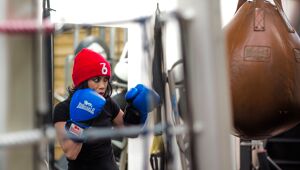
Mitch Harrison has returned. Sorta.
This June 22, Harrison becomes one of the first openly transgender men to compete in a network television competition series with his episode of The Titan Games. Hosted by Dwayne Johnson, the series channels American Gladiators as a series of amateur athletes and fitness buffs compete in a series of outrageous challenges to sit atop Mount Olympus in the winner’s circle.
Born in Utah, Mitch Harrison first rose to fame playing basketball for Stanford University, and later, for the University of Utah. His impressive record could have led to a professional career. Instead, Harrison opted to move to Alaska and pursue a low-profile life, in part, because he’d come out as transgender. Following his transition, Harrison married his wife Krista, and the two have a quiet life together in the Land of the Midnight Sun.
We snagged some time to chat with Harrison ahead of his episode of The Titan Games to chat about his coming out, his episode, and the future of transgender athletes. Mitch’s episode of The Titan Games airs on NBC June 22.
How about we take this to the next level?
Our newsletter is like a refreshing cocktail (or mocktail) of LGBTQ+ entertainment and pop culture, served up with a side of eye-candy.
So, we’ve seen your episode, which airs tonight. We can’t give anything away here, but I have to ask, how do you feel about it all?
I mean, the experience itself from start to finish has been incredible. I’ve been extremely appreciative, beyond the competition itself, of just the experience itself and how I was treated. I would say everyone I encountered was just so kind and generous to me. Really supportive. It made everything that much more special for me and my family. Of course, the competitive aspect of it, I would have loved to have walked away with as much as I could have. There’s something about the competitive spirit—it’s never enough no matter how good you do.
Right.
I’m still really nervous to watch it, just to watch myself. I think what’s most important about it is that this is the first time I’m actually in a competitive atmosphere as Mitch. That’s what I’m most excited and nervous about.
You’ll be happy to know you come off well.
I appreciate that.
Did you know what your competition games would be in advance?
I had no idea. They were very, very good at keeping things under wraps right up until we’d compete. It was pretty much an hour or so when they said “Here’s what you’re going to do, here’s a demonstration. Here are the rules.”

Holy crap.
That’s as much preparation as we got.
So how do you even begin to prepare yourself for something where you have no idea what you’re going to do?
Great question. It was definitely very tough. I was trying to mentally remain in a confident state, knowing that I’d done the best I could to come in prepared physically. So I felt confident in that way. I was pretty nervous throughout because I have severe osteoarthritis from my basketball injuries. So I was nervous to make sure it wasn’t a competition where I’d hurt myself, or where I’d feel it for a few days. It was hard, but that’s where I tried to stay.
When you decided to do the show, was your wife Krista at all hesitant? Being out to friends and family is one thing, but you’re coming out on national television?
I’ve had, of course, some anxiety around it. But I feel that there’s something to offer here besides just myself as a competitor. I’m not aware of many other trans athletes being represented in this way. I’m sure there are a few, but not a lot. I expect there to be some negative reaction, and I feel I’m ready for it. Honestly, what I’ve been through in my life thus far, has prepared me to be in this position. When and if the negativity comes, I’m ready. I know how to handle it. I know the right perception to take on it. And in that state, I know [my appearance] can be something very positive. To have other trans athletes and the general world see it, we’re moving on the path towards more acceptance, to embracing people for who they are. So, I see both sides, but I feel ready, and I see the positive part of it will be much more rewarding.
Related: 2020 Olympics in Tokyo could have record number of openly gay and trans athletes
So, let me ask you a bit more about being a trans athlete. In researching this, I found that you’re still listed on the University of Utah Athletic site as part of the Women’s basketball team. And you were an amazing athlete. I know trans people are very sensitive—understandably—about their deadname. Is it a frustration of yours to have all these listings under your pre-transition self?
To be honest, it used to be something that really was difficult for me. I struggled to talk about it. I struggled to relive it. But I’ve noticed as my life has gone on, and just as opportunities like this present themselves, I’ve been more embracing of who I used to be. I celebrate that person. I celebrate Michelle and what I went through to become Mitch. I’m so grateful for that, especially because towards the beginning of my transition I was like I’m going to erase this person. I never have to think about her again.
And I’ve come to realize how sad that is. At the end of the day, it’s still part of me. She’s part of who I am, and there’s nothing to be ashamed of in that. It can be difficult at times, it can be uncomfortable. But at this point, I’m so much more in a place of celebration for who she was and her strength to help realize Mitch. So it’s much less of a tip-toe around thing. I’m very grateful for her, and appreciative of that.

In your experience as a semi-professional athlete, and as someone who has gone through transition himself, what do we do about the fairness question?
I’ve had discussions about this with my wife. I’d been following the news about high school athletes and some of the clashes going on. It just makes me sad. I can only imagine if I was in high school and pursuing transition at that time what I might personally be feeling. I love to compete. I love the game, I’m a competitor. But I do think there are valid points on the other side when it comes to creating a fair playing field. Obviously transitioning is more complex than just a physical transition.
Of course.
It’s hard to say or provide a clear-cut answer. I think it’s something that will take time. I think there will need to be a lot of time and discussion to fill out how we navigate this. At the same time, just in terms of me entering this show and trans athletes not being well-represented at this point, it’s all pretty new. These issues are new in terms of how we integrate trans high school athletes, or even beyond. How do we create a clear playing field?
Right.
I don’t know. I could see where if we have discussions, rules might need to be adjusted so we can say a trans woman can compete on a women’s team even if she’s already experienced puberty. Or it might lead to creating separate leagues. From my perspective, I can see there is some common sense to saying create a separate league, for example, for trans women. But I think we’d find a lot of backlash to that as well, because it’d be a separate but equal kind of thing.
Yes.
So I don’t know if that’s the answer. Right now, where we sit, it’s going to take a lot of discussion and open-mindedness to listen to how trans athletes feel about their position of wanting to be a competitive athlete but also respecting their gender identity. I feel like if everyone comes into that discussion with an open mind, with a sense of really wanting to make it work, we can navigate that as a society and communities. It’s really hard to say. That’s a great question, and it’s hard to say what would be a clear-cut answer for that. It’s a tough one.
Indeed.
Even though my experience in the sports world provides a certain knowledge of that, it’s a tough one. For example, as a trans man, it might be easier for me to say “I’ll take my hormones and go play with guys.” That’s different from someone going through puberty and wanting to go play with women. There’s so much gray area.
I appreciate you at least acknowledging that it’s a tough question. I’m not sure everyone would do that. And your answer is well said. It’s a conversation to have.
You’ve noted that you had a difficult coming out. Have you reached out to any of your family or friends to tell them about the show? Is there hope that you reconnect?
Unfortunately not. At the same time, I wasn’t expecting anything. To be honest, their awareness of my being on the show has been recent. That’s just kind of how the dynamic has worked. It’s not something I share with them because we don’t have a relationship. I don’t have that contact. As much as I would have loved to have shared it and celebrated it with them, it’s a tough situation. It is what it is. At least, at the end of the day, I do have some family and friends in similar circles that are supportive. That does kind of makeup for it.
That’s good.
I think [my family] isn’t taking it so well, but that’s not a surprise to me. It’s actually something that I’ve been used to for many years now. I’ve come to accept it. And I’m not complaining—if a relationship works better from a distance to avoid toxicity, we can just go our separate ways.
They have every reason to be proud of you right now. So last question, how will you celebrate pride?
I wish we had more to do out here. Obviously, Alaska is a very small community. I would have loved to have gone to Seward, which is a little ways away from us. They actually have the Seward Pride Alliance, which does a pride parade. I was hoping to go to that this year, but with all the COVID stuff going on, things have been canceled. So I think I’ll be active via social media, sharing thoughts, positive quotes, and finding a virtual celebration. We’re all trying to navigate that. I just want to share the love and remind everyone how special this month is for our community. That’s about the best we can make of the situation.
Mitch’s episode of The Titan Games airs Monday, June 22 on NBC.





















LumpyPillows
Good for him. The transformation is amazing.
Cam
I’ve never heard of the show, but I’ll look it up to tune in to see how he does!
Kangol2
Impressive all around.
sillyme
He’s fantastic from what all I can tell and such, and he has tremendous courage to be doing such even at his age and not having really any contact with his birth family to say the least is sad and I’m happy for him in all ways and wish him more success in his future.
ShowMeGuy
Good for him.
There are certain sports which should have co-ed teams to begin with and then all this “Trans-Gendered athletes have an unfair advantage” bullshit becomes even more bullshit.
I’ve watched high school girls play basketball with the boys and knock those boys’ dicks in the dirt. Co-Ed volleyball is a thing…… just not officially at school. I taught at a school where there was no baseball team, the boys played softball and the girls played softball. The schools were big enough to have two teams……..but in a much smaller conference a co-ed team would work just fine. Boys and girls play on mixed tennis teams all the time and golf is another sport where gender is irrelevant.
A girl who wants to play football with the boys….I say go for it…… and several girls have.